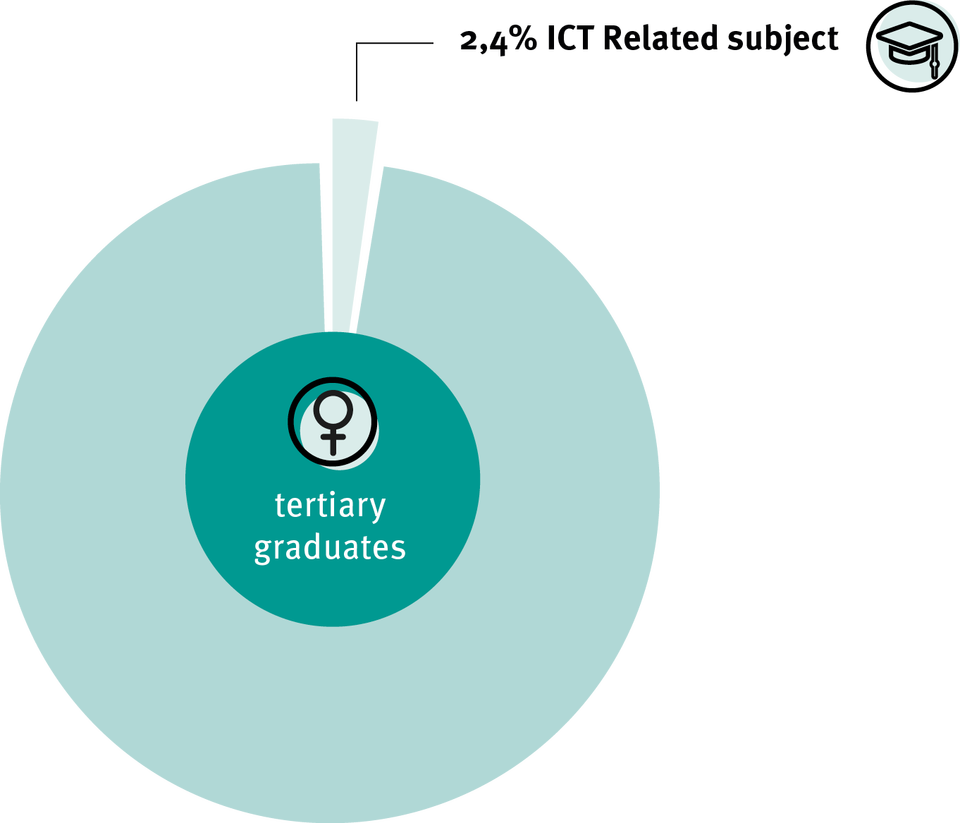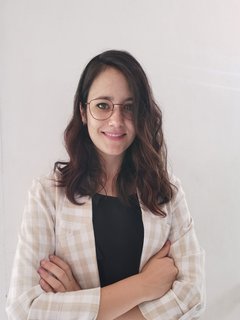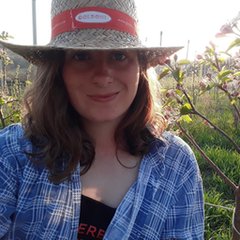with the community 1/2
Interviews



tertiary
graduates
24/1000 ICT Related
subject

6
of those graduated woman go on to work in the digital sector
40%
Women in rural areas of the EU make up below 50% of the total rural population, they represent 45% of the economically active population, and about 40% of them work on family farms.
The SmartAgriHubs taskforce was established with the aim to raise awareness among the SmartAgriHubs community, and the wider Agri-Food network, about gender inclusiveness and equality. Therefore, towards that end, the taskforce is taking action. One of the ways in which this is translated is the newsletter you are reading right now.
With this in the back of our mind, we set out to search for interesting stories from both the SmartAgriHubs and IoF2020 ecosystems. With this collection of interviews and stories, we aim to inform our wider network on the state of gender equality in our sector, shine a light on what individuals and companies are working on, and how they want to improve it.
These are the stories from our community – inspiring, illuminating, and full of useful actions. This newsletter gives their stories a podium.


Interview with Ana Bevc
We interviewed Ana Bevc who is Head of Operations & Business Support at Trace Labs and coordinator of FIE 28 in SmartAgriHubs. Ana didn’t start out in digital technology, a study in journalism led her to discover a love for event management. When she was helping with the content management of event websites this turned into a desire to learn more about digital marketing. Eventually she met the founders of Trace Labs, where she works now.
She started out supporting marketing activities for the OriginTrail protocol and was most active in community building. As the team established itself and started growing, she took on additional responsibilities and is now supporting the business and operations side of activities, while still keeping in contact with the community they have built over the last three years.
What is your connection to SmartAgriHubs and what role do you play?
Within the SmartAgriHubs, I coordinate activities for our Innovation Experiment 28 (FIE) titled Decentralized Trust in Agri-Food Supply Chains. We develop solutions based on decentralized technologies for farm-to-fork data exchange to increase transparency and consumer trust in agri-food supply chains.
Research highlights that investing in women is becoming more important for businesses in the food and agricultural sector and the importance of promoting the sector to younger generation.
Where do you think there are opportunities for women in the sector?
My short answer would be: everywhere. Working in an international environment, I see women in the sector as successful researchers, engineers, managers, communicators, leaders, and supporters.
I believe the women that stand out are as much a product of their own dedication and determination as they are of support they find in their working environment. Personal dedication and vision are important, but so is proper support in the immediate work environment.
That is why I welcome and full-heartedly support all initiatives that are empowering female voices. By providing platforms and opportunities for female voices to be heard, we build a sense of community, a sense of belonging that can make a great difference in fighting imposter syndrome and give individuals the courage, will, and determination to continue on their path, especially when facing different setbacks.
In your view, how does the agri-food sector compare to other sectors when it comes to female engagement?
My experience is that similarly to other sectors, there are areas and jobs where there are more women engaged, like marketing and communications and there are others where female representation is quite low, like management and engineering. And this seems to be true both at the farm level and further down the supply chain – at cooperatives and food processing plants – as well as in research and at ICT companies.
I know this publication is dedicated to gender equality, but I believe in embracing and actively pursuing diversity in the broader sense. Openness, inclusivity, and engagement are the values that the agri-food sector should continue to build on to promote diversity and harvest the benefits this can bring to the industry. Building on these values promotes the exchange of different ideas and opinions, which can help develop better and more creative solutions to whatever challenges the sector is facing.
What advice would you give any young woman starting out today to build a career similar to yours?
Do not be afraid to venture out into agri-food ICT even if you do not have a tech background. We need engineers to develop technologies and build technological solutions. But more importantly, we need understandable and useable technologies. This means we need people to help simplify their use through user-experience design, easy-to-use interfaces and easy-to-understand instructions. Especially in agri-food, where digital literacy is often an issue.
My lack of a formal (agri-)tech education is an advantage for the work that I do. Often, I am in the middle, between our developers and the communities we work with. If our team can explain complex technological issues to me in simple terms, we are already half-way to making sure our communities will also understand them. And if I do not understand the instructions or get lost in the user interface, chances are that our users will feel lost as well.
Stay curious - this is equally if not more important. Educate yourself as much as you can. Aim to understand, even if it is a complex topic on the border of daunting. This will provide growth for you, both personal and career wise. Which brings us back to do not be afraid. Do not be afraid to ask questions, to reach out to people who know more on the topic than you do, to find a mentor. Offer support to receive support. Build meaningful relationships with your co-workers.
And find passion in the work you do. Something that you believe in, something that aligns with your personal values. All of this can help you create a truly fulfilling career and a sense of purpose with your work regardless of where you are starting from or going to.
What can agribusinesses do better?
Stay open to seemingly crazy innovative ideas and do not be afraid to experiment. And make sure all voices in the business are heard to harvest the wide range of creativity that different people can produce. With the world constantly changing and global crises emerging, from pandemics like COVID-19 to climate change, innovation and creativity are the only way to build resilience in the agri-food supply chains. And this resilience we all need.
Female role models needed!
Whenever Jürgen Vangeyte, scientific director at the Agrifood technology department of the Flemish Research Institute for Agriculture, Fisheries and Food (ILVO) gives a presentation, he shows a slide with the gender composition of the workforce at ILVO. “This is essentially balanced”, he says. “And when I look at most of the audiences, the composition is somewhat different...”
His understatement underlines the male dominance in many agri-food companies. He is a firm believer in the need for change. “There must be much more female representation, both in audiences of such conferences and on stage”, he says. “Gender balanced teams enrich the business knowledge and development. It is just beneficial. Having (more) women on board is an important element for change. A second element is putting female role models at the forefront. Who are these women in executive positions at agri-food businesses and what drives them? These role models are of great inspirational value especially for young women.”
Culture dominates structure
At ILVO Jürgen works in an organisation with a perfect gender balance: 51% of the staff is female and in positions requiring higher education the female share in the workforce even adds up to 54%. “This is not a result of a dedicated policy but of our culture”, Jürgen points out. “At ILVO we firstly consider people, their affinity and skills and how this can benefit our and their development. Regardless of gender. We don’t try to squeeze people into a given structure. At ILVO culture dominates structure.”
Female attraction to digitisation
His department Agrifood technology, which develops solutions for agriculture and food using new digital technologies, also has a balanced gender composition, but here technology is the exception. “The 12 people tech team that develop our machinery and prototypes, are all male”, Jürgen admits. “But in our labs, more women are represented. Sure we want to engage more women in technology and in field research, but also here we don’t have a gender policy. Our vacancies, also in precision farming, attract more female applicants. I think this relates to women in agriculture being traditionally more involved in administrative functions. The digitisation of the agri-food sector and the increased relevance of data management and analysis, attracts more women.”
Work-life balance
Jürgen acknowledges that research shows a different picture with more female engagement than mainstream businesses in the agrifood sector. Also here, ILVO sets a great example: “We offer ample opportunities for a good work-life balance, like working from home and flexible leave arrangements”, he says. “This is based on mutual trust. I know that this is a strong incentive for female applicants and therefore worthwhile considering for any company who wants to improve its gender balance.” And there is more in his view: “Mixed teams with complementary members are more creative. Women are strongly interested, committed and well-educated to work in the agritechbusiness. This offers many opportunities in finding the skilled people you need.” Given the current race for talent, this message is hard to ignore.
Mixed teams of men and women are more innovative
A Russian woman and a German man leading an IoF2020 project in a Spanish company with pilot deployments in Portugal, Poland and Hungary. According to Ekaterina Ukhandeeva and Lars Berger, this from a gender perspective balanced project leadership tandem shows how their company Pulverizadores Fede has implemented a balanced approach in gender equality. In the agri-food sector at large however, a change for the good is urgently needed. Not in the least for the sake of innovation.
“Such a balanced approach goes beyond gender and reflects not only mixed teams of women and men but also of multicultural teams with members of different backgrounds and nationalities”, says Dr. Lars T. Berger, Chief Technology Officer at Pulverizadores Fede, a Spanish based designer and manufacturer of air blast sprayers and trailed mist blowers for the agriculture sector. “Social and technical development can only be understood in terms of equality and diversity.” “Both men and women can perfectly and equally do work which requires specific analytical skills”, adds Assistant General Manager Ekaterina Ukhandeeva. “It is not about a difference in gender, but about personal skills of each individual.”
Creativity and innovation
Both see encouraging signs of women becoming increasingly influential, also in ICT careers in the agri-food sector. Still, they know that the road to equality is still a long travel. “The agricultural sector is traditionally male dominated and gender equality is one of its biggest challenges”, says Ekaterina. “As ICT education includes more and more women, digitisation offers opportunities to create a more gender balanced sector.” This also yields a huge opportunity for sustainable development. “Men and women can have differences in their point of view on problems or topics”, Ekaterina explains. “That’s why mixed teams of men and women are very beneficial in terms of collaboration, creating new ideas and innovative solutions. These teams offer a wider spectre of opinions and innovative solutions.”
Grassroots development
Breaking up the traditional culture and stereotypes that create barriers to female engagement in agri-food companies and in all social and economic sectors, should be a grassroots development. “It starts with basic education and how we bring up kids without gender prejudices”, Lars says. “The future of women engaging in ICT-education starts in primary schools, with non-gender games and toys, and with non-sexist mass media that give visibility to women in science and ICT.” “Indeed female engagement in ICT education is a question of general education”, says Ekaterina, referring at the importance of companies setting the right example. “At Pulverizadores Fede we work in teams whose composition relates more to the skills and experience of each member, than to a planned composition on a gender aspect.” “Gender equality is one of the United Nation’s Sustainable Development Goals”, adds Lars. “Pulverizadores Fede is highly committed, which is also reflected in the high number of female executives in our company.”

Ana Peñaranda Verdú, hardware and software development research engineer at HOPU
As a firm believer of renewable energies, optimization and resource management Ana Peñaranda Verdú started her career at a renewable energy company developing software for the inspection of mirrors on a solar thermal plant. Right now she works at HOPU where started working on IoF2020’s use case 3.2, a project of which she is now the project leader, working both at hardware and software level. She is also involved in use case 5.6 where she mainly works on the validation of the development.
She grew up in the world of industry because her father designs machinery for the food industry. As she is most interested in automated processes, she decided to study industrial electronic and automation engineering at the UPCT (Spain), and later did a master's degree in ‘New Technologies in Computer Science’. Currently, she is also doing a PhD ‘industrial IoT device intrinsic safety’.
Ana, the ICT sector sees a lot more man working in it than women. According to an article from 2018 by the European Commission only 9 % of developers are women and 19% of people in management positions in the ICT sector are women, why do you think this is the case?
I have asked myself the same question and have come to the conclusion that this is due to the education that is received from childhood, equality begins with education. I still see that there are many prejudices of the predominant female or male professions and this ends up conditioning the choice of the younger ones. Girls do not choose to train in this sector even though it is booming. Since I started studying, women have only represented 20% of the total class. In addition, I think the lack of references in this sector has an influence.
Another reason is the salary gap, according to recent studies there is still a salary gap of around 20%.
In spite of this, I believe we women are forming ourselves, and we are stepping strong so that over the years, the situation will become regularized and it will be normal to see women doing jobs considered to be men's. Changing mentality, culture and education are the fundamental pillars to reduce the gender gap.
Regarding female engagement in digitalisation: is Spain/Southern Europe different compared to other European regions?
Spain has a relatively low percentage of students who choose to follow STEM disciplines compared to the rest of Europe. We also rank low when it comes to the percentage of male and female students enrolled and graduated in the ICT field.
For me this has to do with the level of digitalization of the country and the cultural tradition of the sector together with the aesthetics of the role of women, mixed with the young age of this sector in Spain. This results in an overwhelming masculinisation of the sector. Fortunately this is already changing; I know more and more women who are dedicated to the technological world.
What barriers do you see for women in agri-food ICT and what do you think would break these barriers?
I believe that there should be no barriers in terms of gender difference, but there still are. One of the barriers that I find is education. Since childhood we are inculcated, even indirectly and often unconsciously, with the idea that technology is something for men. Because of this women are not informed in the matter or do not believe they have the capacity to work in technology. Having successful female examples in the ICT field is key to encourage, motivate and inspire other women to choose technology.
Cultural tradition is also a barrier. Spain is working on this by changing basic policies. For example, equalizing leave for the birth of a child and calling it "leave for birth and childcare", and also the promotion of work schedules in accordance with schools.
There is still a need to educate children and employers under the umbrella of equal rights and responsibilities so that women have a greater presence in the sector.
In the last decades women are taking a step forward in the defence of equality, we have advanced a lot in this matter but there is still a way to go and I think that we all need to contribute to this.

Interview with Doris Letina, Vice President at CEJA Young Farmers and apple farmer.
Doris Letina is a young farmer from Slovenia who works on her family's farm that focuses on the production of apples. She studied economics at the University of Ljubljana and also received a qualification in agriculture. Doris is the Vice President at CEJA, the European Council of Young Farmers and an active member of Zveza Slovenske Podeželske Mladine (ZSPM), the Slovenian rural youth association. Although she has gained much experience and knowledge in various fields, she believes that working on her family’s farm has taught her the most lessons. “The farm allowed me to understand how beautiful agriculture can be, but also taught me how challenging life as a farmer can be, especially as a young and female farmer” Doris tells.
Challenges for young farmers
Access to land, finances and knowledge and the risks associated with climate change are just some of the challenges young farmers face, according to Doris. The risks inherent to entrepreneurship and the uncertainty of the sector, notably in terms of income, have an impact on the attractiveness of farming. Doris says, ''We, therefore, need to create a solid foundation that will enable business development and viability for those missing entrepreneurs who are the next generation of farmers. All stakeholders have the responsibility to (co)create an enabling framework for them.''
Women in the agri-food sector
In Slovenia, less than 6% are young farmers, out of which 20% are female. Although Doris is convinced that more women want to be involved in farming, she feels that they are being held back by the obstacles to enter the sector. There should be more opportunities for women, starting with education and proper training. Doris also points out the prevailing prejudices and lack of recognition for female farmers. In the eyes of many families in the agri-food sector, women are often times still seen as the 'farmer's wife' instead of independent farmers.
“It is sad that we still need to shift the prejudice from being ‘the farmer's wife’ to being ‘the farmer’”.
When families hand the responsibility of their farm over to a daughter, it is often with much lower expectations. And this is neither fair nor sustainable for the farm and ultimately for the agricultural sector. According to Doris, women in agriculture work and manage farms on an equal footing, or even better. Yet, their role is still under-recognized. Doris feels the responsibility to bring about change, both at the individual and societal level. The sector must promote women in the agri-food sector in order to break the stereotypes.
Despite the many obstacles that women face, Doris is optimistic for the future. There are a lot of amazing, innovative and successful female managers leading farms. Not only do they perform in their productions, but also in promotion, refined sales; all of this while taking care of their family. Such inspirational profiles are the future of farming, and they need to gain more visibility so that other women feel empowered as well.
Finally, we asked Doris what advice she would give to other young women. Doris: ''My mother taught me that with perseverance, strong will, common sense and knowing yourself and others in the sector, it is possible to overcome all obstacles. She succeeded applying this philosophy and followed her path.’’ Doris added humorously: “however, you need nerves of steel to do this job!”
Doris hopes to inspire other young women to pursue a future in farming. She is a great example of an independent and strong woman in the agri-food world. May many others follow her.
